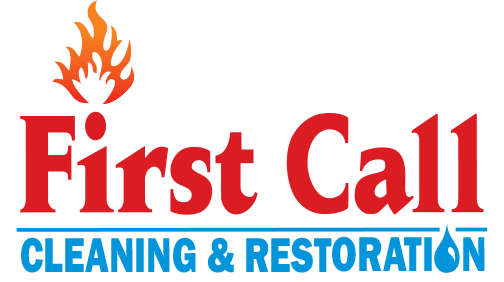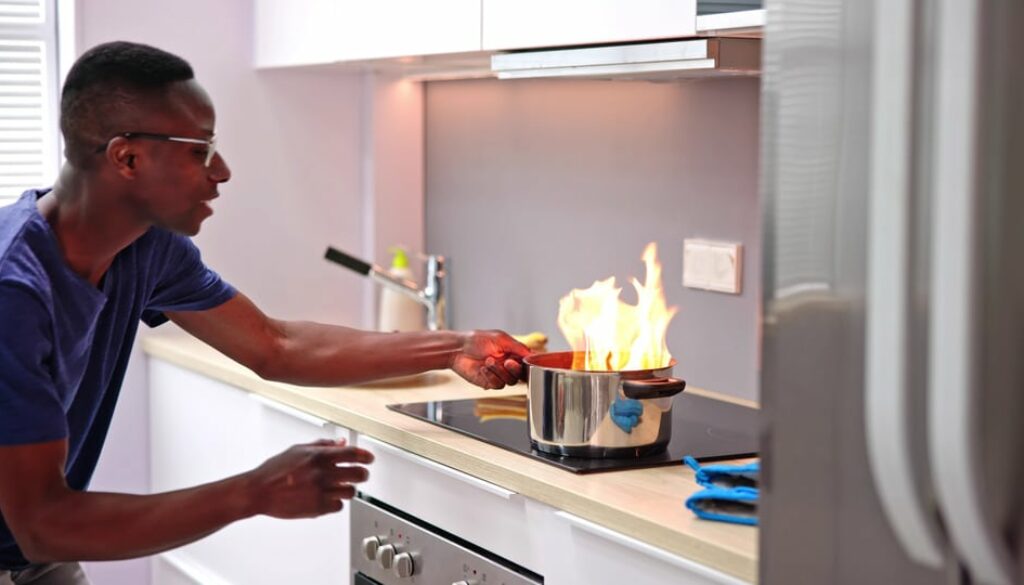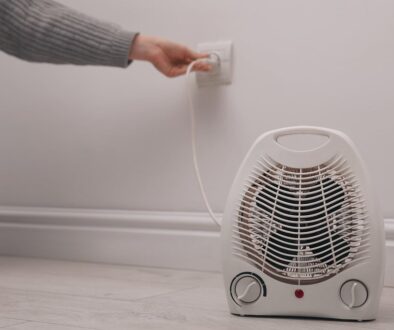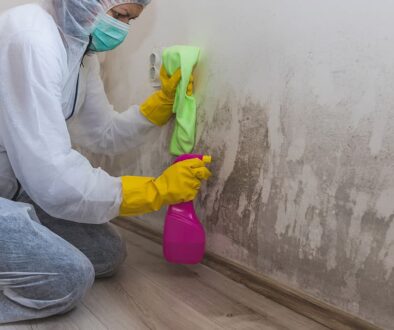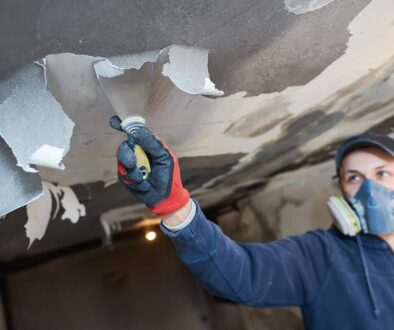Kitchen fires can happen to anyone, and they are more common than you might think.
According to the National Fire Protection Association, kitchen fires hit their peak at Thanksgiving and Christmas, when fire departments respond to almost 500 cooking fires every day.
But what is the most common cause of kitchen fires in the Greensboro, Burlington, and Raleigh areas? In addition, what can you do to stay safe?
As experts in the fire restoration business, we have seen firsthand the devastating impact of house fires throughout Guildford, Alamance, and Wake counties. That’s one reason why we want you to be aware of the most common cause of kitchen fires, how to put out a kitchen fire, and precautions you should always use when cooking.
We go in-depth for each of these subjects below.
The Most Common Cause of Kitchen Fires
The most common cause of kitchen fires is unattended cooking.
It’s easy to get distracted while cooking, but a fire can start in just a matter of mere seconds. This can happen when you leave the stove or oven on and forget about it, or when you leave a pan on the stove and walk away. Even if you only leave the kitchen for a few minutes, it’s enough time for a fire to start.
The best way to prevent the most common cause of kitchen fires is to always stay in the kitchen while you’re cooking. If you need to leave the kitchen for any reason, turn off the stove or oven. It’s also a good idea to keep a fire extinguisher in the kitchen in case of emergencies.
Other Causes of Kitchen Fires
While unattended cooking is the most common cause of kitchen fires, there are other common causes as well. These include:
Flammable materials
Keep flammable materials away from the stove, such as dish towels, curtains, and paper products. These can easily catch fire if they come into contact with the stove.
Grease
Grease is highly flammable and can easily catch fire if it gets too hot. Make sure to clean up any grease spills immediately and avoid leaving hot grease unattended on the stove.
Electrical appliances
Electrical appliances such as toasters, blenders, and microwaves can also cause kitchen fires. Make sure to unplug these appliances when they’re not in use and avoid using them near water.
Gas leaks
If you have a gas stove, make sure to check for gas leaks regularly. Gas leaks can lead to explosions and fires, so it’s important to address them immediately. If you smell gas, call your gas company or call 911 immediately.
Unintentionally turning on—or forgetting to turn off—cooking equipment
Be sure to double-check to be sure your stovetop or oven is completely turned off before you leave your home. Be aware that even when these cooking devices are turned off, they can still generate heat until they cool down.
Precautions to Take to Prevent the Most Common Cause of Kitchen Fires
Preventing the common causes of kitchen fires requires a few simple precautions. These include:
- Stay in the kitchen while cooking.
- Keep flammable materials away from the stove.
- Clean up grease spills immediately.
- Unplug electrical appliances when they’re not in use.
- Check for gas leaks regularly.
- Keep a fire extinguisher in the kitchen.
How to Extinguish a Kitchen Fire
If a kitchen fire does occur, it’s important to know how to extinguish it safely. Here are the steps to follow:
Turn off the heat source
If you notice a fire in your kitchen, the first thing you should do is turn off the heat source. This could mean turning off the stove, oven, or any other appliance that’s causing the fire.
Smother the flames
If the fire is small and contained, you can try to smother it using a lid or baking sheet. Simply place the lid over the pan or pot that’s on fire and turn off the heat. This will help to suffocate the flames and prevent them from spreading.
Use baking soda or salt
Baking soda or salt can also be used to extinguish a small kitchen fire. Simply sprinkle the powder over the flames, and it will help to smother them.
Use a fire extinguisher
If the fire is too big to handle with a lid, baking soda, or salt, it’s time to use a fire extinguisher. Make sure you have a fire extinguisher in your kitchen that is appropriate for grease or electrical fires, which are the most common types of kitchen fires.
Evacuate the area
If the fire is spreading and you’re unable to control it, it’s important to evacuate the area immediately. Call 911 and wait for the firefighters to arrive.
Knowing how to extinguish a kitchen fire can save lives and prevent property damage, whether you own a home in Burlington, or a restaurant in Greensboro, or need help with a school cafeteria in Raleigh.
Remember to turn off the heat source, smother the flames, use baking soda or salt, or use a fire extinguisher when necessary. Stay safe in the kitchen!
If You Do Need Fire Restoration Services in Alamance, Guilford, or Wake Counties, First Call Is the Right Call
Home fires are devastating. But despite your best efforts at staying safe, a kitchen fire could break out. We hope you never experience a tragedy that calls for fire damage restoration services , but if you do, we want you to know that First Call is ready to help.
We take care of documentation and work with the insurance company so you can avoid headaches and minimize stress.
We’re the leading fire restoration service in Burlington, Greensboro, Raleigh, Alamance, Guildford and Wake counties. Contact us for a free estimate and discover why First Call is always the right call.
